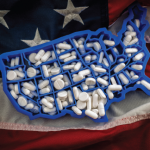West Virginia has been on the front line of the opioid crisis. In 2015, the state led the nation in drug overdose death rates for the third consecutive year. Preliminary numbers for 2016 recorded 883 drug overdose deaths, with 755 involving at least one opioid, up from 629 total deaths in 2014.
Autopsies Inc.
Few know the opioid crisis like the father-son duo Sidney and Curtis Goldblatt. The pair run two companies, ForensicDx for autopsies and MolecularDx for drug testing, out of Windber, Pa. Together they conduct autopsies for 10 Pennsylvania counties, including Indiana, charging between $2,000 and $3,000 per body.
In 2014, overdoses represented about 40% of the deaths they handled, the Goldblatts says. Last year, that shot up to 62%. Goldblatt senior has been performing autopsies for 50 years and says he has never seen anything on the scale of the current epidemic. When he started, a drug overdose was rare. The pair opened ForensicDx in 2014 with a staff of three, serving only three counties. That’s grown to seven staff and 10 counties, mainly to meet demand from drug-related deaths, the Goldblatts says.
Indiana County’s ambulance service is also under financial stress because of the opioid crisis. The county’s primary ambulance provider, Citizens’ Ambulance Service, has lost more than $100,000 since 2016 alone on opioid calls, said Randy Thomas, director of operations.
The non-profit is reimbursed only if an opioid overdose patient is transported to the hospital. It doesn’t get paid for successfully treating people who have overdosed but then refuse to go to the hospital, Thomas says.
People brought back from the brink of death after a dose of the life-saving drug naloxone, also known as Narcan, often awake angry and combative and refuse hospitalization, Thomas says.
As costs related to the opioid epidemic increase, Indiana County commissioner Baker isn’t sure what will happen next. Unless the state or federal government intervene, the county will have to either cut services or increase taxes, Baker says.
“This has introduced an entirely different metric, an entirely different level of unpredictability in budgeting,” he says.
For all the budget problems Baker faces because of the crisis, the human toll is what distresses him most. Last fall, Baker’s nephew died of a fentanyl overdose. He was 23. Talking about his nephew’s death, Baker pauses to collect his thoughts.
“It is a most painful and difficult experience and I wouldn’t wish it on anyone in the world,” he says.
Reference
- Staff. Opioid fallout. Reuters. 2017 Aug 11.



